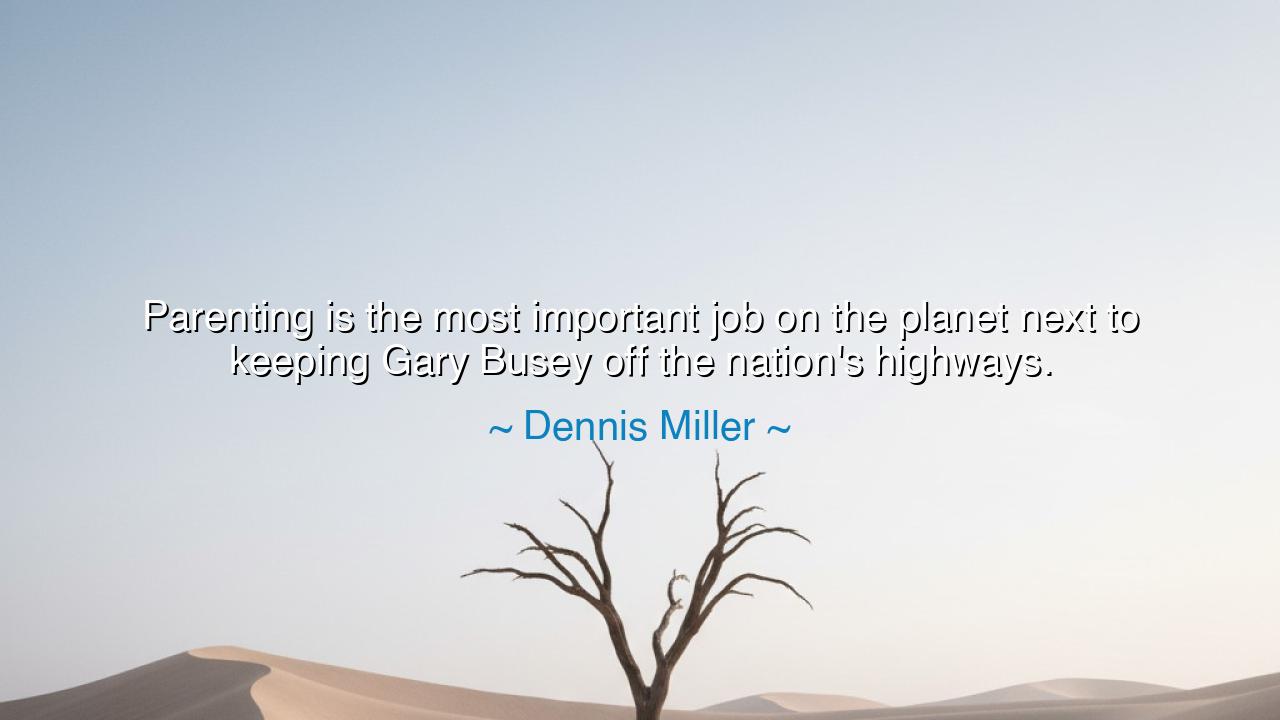
Parenting is the most important job on the planet next to
Parenting is the most important job on the planet next to keeping Gary Busey off the nation's highways.






Hear, O seekers of both wisdom and laughter, the words of Dennis Miller, who with his sharp wit declares: “Parenting is the most important job on the planet next to keeping Gary Busey off the nation’s highways.” In this jesting phrase lies more than comedy—it is a reminder that parenting, though wrapped here in humor, is a sacred responsibility of unmatched weight, shaping not only the lives of children but the destiny of the world itself. The mention of Busey is satire, yet its placement emphasizes by contrast just how monumental the task of raising the next generation truly is.
The origin of this insight rests in Miller’s style of commentary, which often blends satire with truth. By pairing the gravity of parenting with the absurdity of keeping a flamboyant celebrity off the roads, he magnifies the seriousness of the former. Beneath the laughter is a profound recognition: among all human labors—politics, wealth-making, entertainment, conquest—there is none more vital than guiding a child toward virtue, compassion, and resilience.
History itself confirms this. Consider Marcus Aurelius, emperor of Rome and philosopher of the Stoic tradition. Though he ruled a vast empire, he wrote in his Meditations that his greatest concern was not merely the governance of Rome, but the moral instruction of his son, Commodus. Yet history shows how difficult this task proved; Commodus fell into corruption and tyranny, undoing much of his father’s work. This tale demonstrates Miller’s point: the stakes of parenting outweigh even the ruling of empires, for they shape not just individuals, but the course of nations.
The emotional truth of Miller’s words is this: parenting is an “invisible labor,” one that does not receive trophies, headlines, or applause, yet upon it rests the foundation of all society. When parents falter, the cracks appear not only in households, but in schools, communities, and nations. The humor of his phrasing softens the sting, but the core lesson is hard: to raise children without guidance is to endanger the very roads of the future.
Practically, his reflection calls parents to remember that while perfection is impossible, presence and effort are indispensable. There will be chaos, mistakes, and days of doubt. Yet the call is not to mastery, but to steadfastness: to love, to teach, to correct, and to guide with patience. Just as a driver must hold the wheel firmly to prevent a crash, so too must parents keep steady hands upon the course of their children’s upbringing.
There is also a heroic dimension here. To laugh, as Miller does, is to admit that parenting is both absurd and sacred, both chaos and glory. It requires the strength of warriors, the patience of monks, and the humor of jesters. To endure the sleepless nights, the endless questions, the teenage storms, and still stand firm with love is a heroism greater than any battle or crown.
From this reflection emerges a clear lesson: let parents honor their work as the greatest labor under heaven. Take it seriously, but not without laughter. Strive with all your might, but accept imperfection. And above all, remember that your role is irreplaceable: the shaping of souls is more vital than the shaping of kingdoms.
Thus, Miller’s humorous yet profound teaching endures: parenting is the most important job on earth. Let future generations hear this and smile, but also take heed. For in the laughter lies truth: to raise children with wisdom and love is to safeguard the highways of humanity itself.






AAdministratorAdministrator
Welcome, honored guests. Please leave a comment, we will respond soon